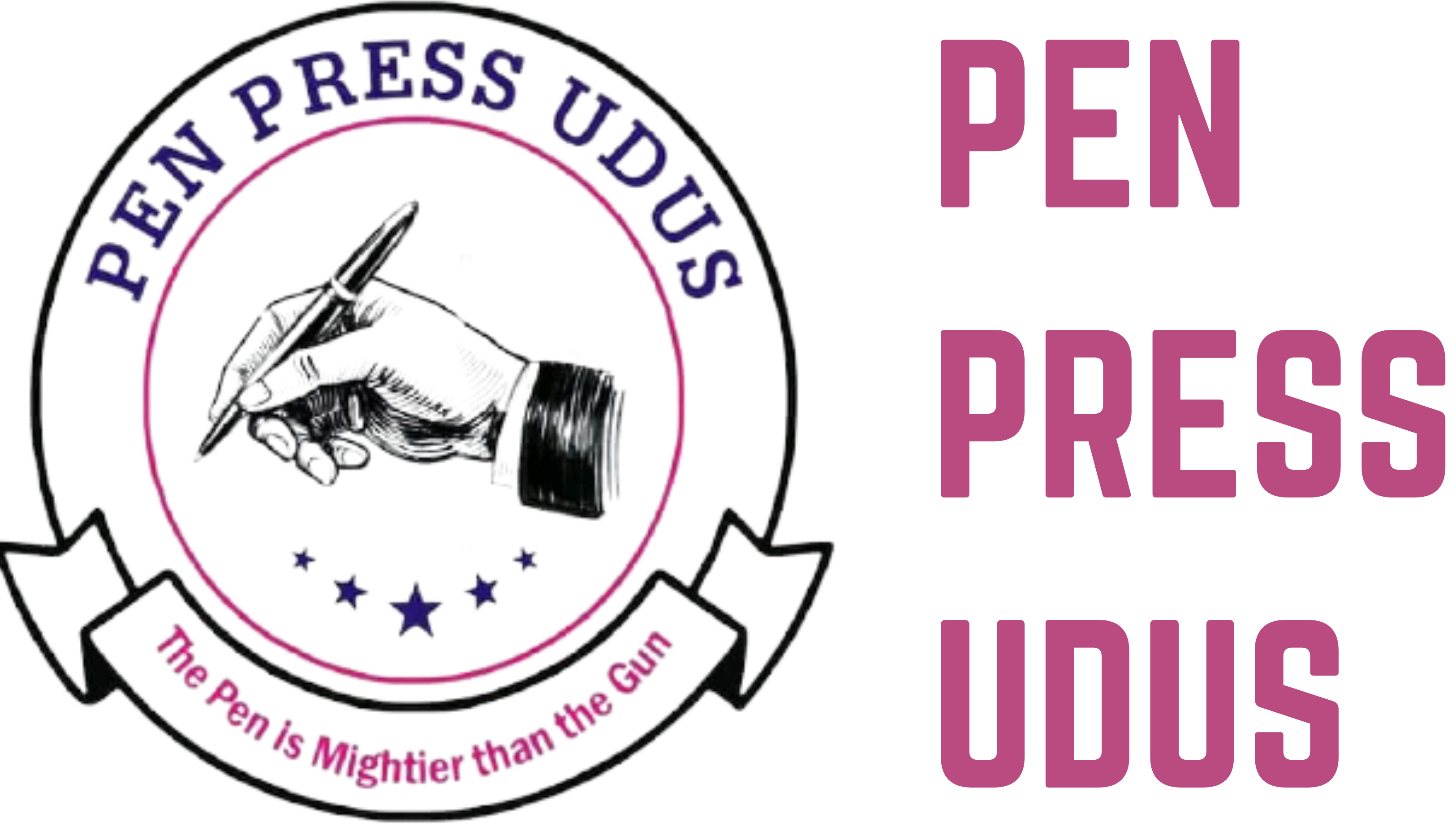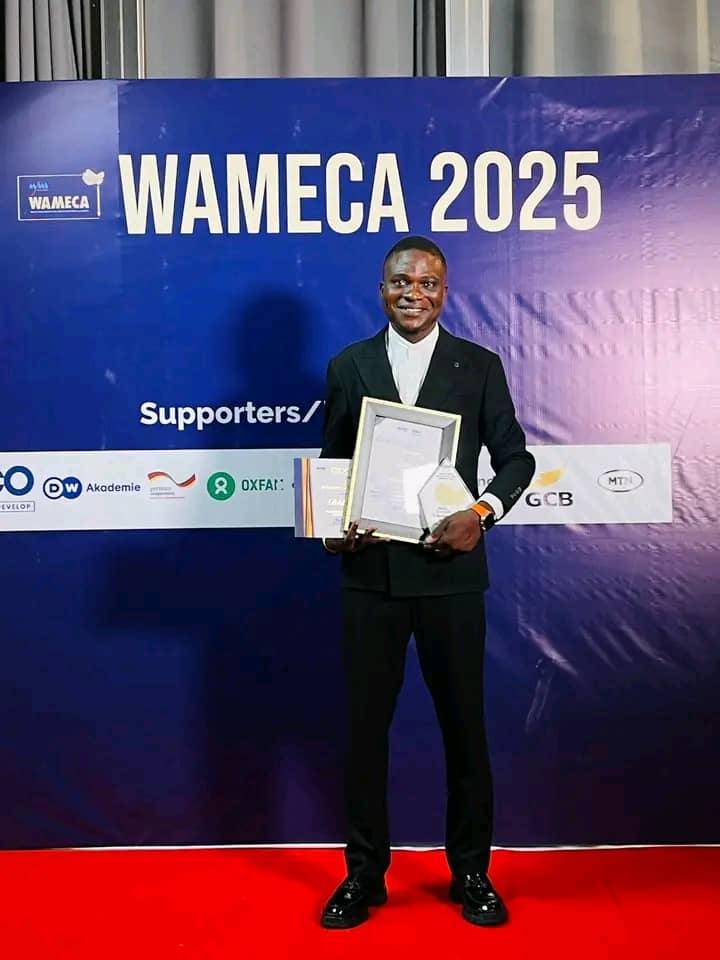By: Luqman Kamaldeen Oladayo
The hall was silent. Hearts raced. Cameras flickered. At Alisa Hotel in Accra, Ghana, the anticipation was electric as the names of winners for the 2025 West Africa Media Excellence Conference and Awards (WAMECA) were about to be unveiled. Among the finalists sat a young man in a modest black suit, calm on the outside, storming within.
“Prior and during the announcement of the winners, I was pensive and tense, regardless of the faith I had in the story I submitted,” recalled Abdulrasheed Hammad, moments after his name echoed across the hall as the winner of the Telecommunications and ICT category. The applause that followed wasn’t just for him; it was for persistence, for integrity, for a story that dared to speak truth to power.
Just a week earlier, Pen Press UDUS had proudly celebrated the news of its alumnus being shortlisted among 26 finalists from across West Africa. Yet, no one, not even Hammad could have foreseen that he would walk away as one of the nine ultimate winners, out of 783 entries submitted by journalists from 15 countries.
His winning piece, “Fiscal Transparency: Despite ICT Advancement, Nigerian States’ Open Contracting Portals Inaccessible,” published on January 5, 2025, exposed how several Nigerian states, after receiving World Bank grants, failed to uphold transparency.
The grants required them to build open data portals where citizens could monitor public contracts, but most of these portals were either empty, inaccessible, or deliberately blocked.
“It was shocking,” Hammad said. “Some states created portals but didn’t upload data; some made theirs inaccessible, and some even threatened me for trying to access their websites. My story was about accountability, about showing how technology meant to expose corruption was being used to conceal it.”
What distinguished Hammad’s work was not just its depth but its ambition. He extended his investigation beyond Nigeria, examining other West African countries under the same program. It was a rare cross-border journalism effort, one that blended data, fieldwork, and storytelling in a way that forced people to pay attention.
During the award ceremony, the judges described his report as “meticulous, daring, and profoundly impactful,” commending his decision to go “from state to state, portal to portal, and country to country” in pursuit of the truth.
For Hammad, the real prize was not the plaque he held on stage. “This recognition means more than words can express,” he said. “It tells me my work is seen. It assures me that accountability journalism matters. It fuels my fire to keep digging, because truth always deserves a voice.”
He credited the International Centre for Investigative Reporting (ICIR) for funding his story under its Open Contracting Reporting Project, and expressed heartfelt gratitude to ICIR’s Executive Director, Dayo Aiyetan, for encouraging him to push his investigation beyond Nigeria’s borders.
The WAMECA 2025 ceremony itself was a grand celebration of journalistic excellence, featuring delegates from media organizations, civil society groups, and regional bodies. Supported by co-Develop, DW Akademie, OXFAM in Ghana, 11th Hour, GCB Bank, and the Africa Nenda Foundation, the event honoured journalists whose stories challenged corruption, defended democracy, and advanced truth.
All 26 finalists received certificates of merit, while nine winners — including Hammad, walked away with plaques, certificates, and cash prizes. But the true reward, as Hammad described it, was the experience.
“I met journalists from Ghana, Burkina Faso, Togo, Sierra Leone, Senegal, and others,” he said, his tone brightening.
“We were trained by DW Academy on podcasting and digital security. The exposure was immense. Just being in that room, among Africa’s best, was enough motivation to keep going.”
The Media Foundation for West Africa, the body behind WAMECA, the award isn’t just about celebrating journalists, but about strengthening press freedom and accountability across the sub-region. Established in 1997, the foundation has become a beacon of media advocacy, giving a platform to stories that challenge silence and ignite reform.
For many at Usmanu Danfodiyo University, Sokoto, where Hammad’s journalism journey began, his victory carried something deeper, a message of hope. From campus pressrooms to continental recognition, his story embodies the power of persistence, integrity, and purpose-driven storytelling.
Abdulrasheed Hammad’s journalism résumé reads like a journey of growth etched in courage. A lawyer and investigative journalist with more than six years of experience, his works have appeared in ICIR, The Cable, Minority Africa, University World News, Ripples Nigeria, Health Policy Watch, and Dataphyte. His focus areas — accountability, health, education, climate change, and governance — are woven together by one common thread: impact.
He has bagged several awards, including the Africa Media Development Foundation Award (2024), Silver in the PAJI Africa Investigative Journalism Award (2023, Senegal), and recognition in the Alfred Opubor Environmental Reporting Award (2022). His fellowships span across the British Council’s Future News Worldwide (2022), AIJC Fellowship (2020), and various ICIR, ICFJ, and Thomson Reuters programs.
Before all these international feats, he was once the Editor-in-Chief of Pen Press UDUS (2021) — a young campus journalist armed with nothing but passion, persistence, and a pen sharp enough to hold power accountable.

